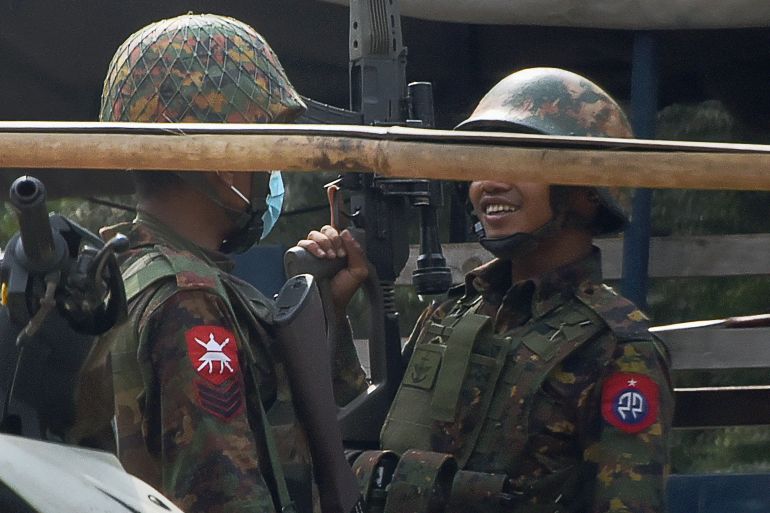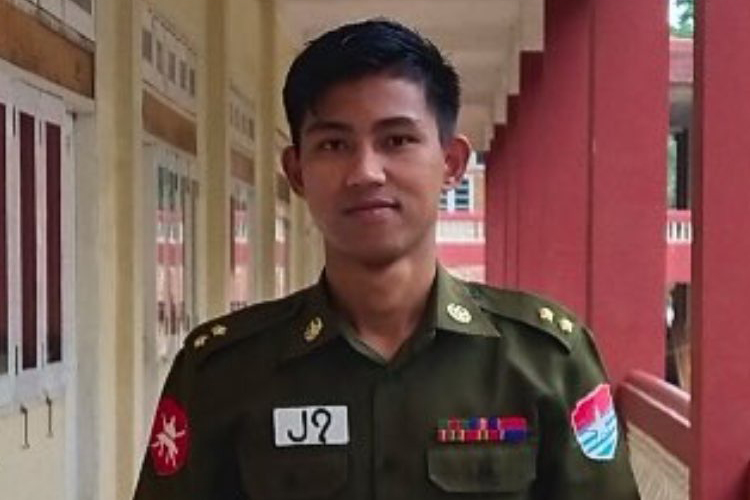Myanmar defectors describe military culture of abuse, fear
Defectors say at least 2,500 soldiers have deserted Myanmar’s military to join the resistance since last year’s coup.

Captain Pyae Sone waited deep into the night before making preparations to flee. His superiors had ordered him to gather 25 infantry soldiers under his command to attack anti-coup protesters the next morning.
But from his military base near the city of Dawei in southeastern Myanmar, the prospect of killing innocent civilians deeply troubled him.
Keep reading
list of 4 itemsMyanmar’s ‘reluctant’ resistance fighter
New EU sanctions target Myanmar military’s lucrative gas firm
Myanmar: Resisting the Regime
“I knew that I could not command my soldiers to inflict such brutality on civilians,” the 30-year-old told Al Jazeera by phone.
So, as soon as dawn approached on April 16, 2021, Pyae Sone snuck off his army base. Heart racing, he boarded a small plane that would fly him to rebel-controlled territory.
“Escaping by plane was the only option,” he explained. “Leaving by car would have been impossible given the number of security checkpoints throughout the eastern coast’s terrain.”
From Dawei, Pyae Sone Oo travelled to eastern Karen state, to territory controlled by the Karen National Union (KNU), an opposition political group with a large armed force. His brother, also an officer in the army, had already defected and joined the resistance there.
The two men are among thousands of troops who have reportedly deserted Myanmar’s military, known as the Tatmadaw, since it overthrew the democratically elected government of Aung San Suu Kyi on February 1 of last year.
People’s Soldiers, an organization working to help troops leave the Tatmadaw, estimates as many as 2,500 soldiers have defected since the military’s power grab and its deadly crackdown on peaceful protesters. Almost 1,600 people have been killed and 10,000 have been detained since the coup, according to rights groups, while hundreds of thousands have been displaced as civil war broke out across the country.
Tatmadaw propaganda
Even before the coup, the Tatmadaw was infamous for carrying out extreme violence against its own people. For decades, security forces have shelled and raided villages in areas controlled by ethnic armed groups in the borderlands, often forcing men to work under the threat of death. They have long used rape as a weapon of war, and in 2017, committed what many label “genocide” by cracking down on the Rohingya Muslim minority, killing thousands, burning villages and forcing some 700,000 people to seek refuge in neighbouring Bangladesh.
Pyae Sone is all too familiar with the violent tactics of the military. Having seen firsthand how the system conditions soldiers to inflict violence on citizens, he understands the psychology behind the destruction.
“The talking point that they always propagate is that the Tatmadaw is an institution that holds the country together, an institution that protects Buddhism,” he said. “Should the Tatmadaw not exist, then Myanmar would become a slave state of the West and Buddism would cease to exist in the country.”

He explained that most of the lower-ranking soldiers are “brutalized into buying into the propaganda,” but many officers like himself have more access to information, education, and knowledge of the Tatmadaw’s long history of violence on civilians.
He said the Tatmadaw forces young vulnerable men to join and also enlists criminals who are seeking to dodge charges. It then conditions troops to believe that they are part of an honourable and heroic part of society. This “ideology” incentivizes troops to carry out their orders, even if it means carrying out atrocities, he added.
“Once I got out, that’s when I learned the full extent of how the military was inflicting horror on its own citizens,” Pyae Sone said.
‘A military caste’
Anthony Davis, a security analyst who specializes in southeast Asian militaries, shares much of the former captain’s observations.
“Training for Tatmadaw infantry troops is invariably rigorous and often brutal,” Davis told Al Jazeera. “A level of brutalization is part of the course in the training process. Beyond that, Light Infantry Divisions operate as assault troops usually deployed against insurgent-held areas where they often take high casualties, and those losses go to compound the process of brutalization.”
Davis believes that the number of defections may not be as high as that claimed by the People’s Soldiers, but acknowledges that the Tatmadaw is built to be incredibly difficult to leave.
A spokesman for Myanmar’s military did not respond to emailed questions at the time of publication.
“Once you’re in the family, you’re in for good,” Davis said. “You live on an army base, your family lives on an army base, your kids go to school on an army base. The Tatmadaw is as much a military caste, an entire social ecosystem, as an army in the narrow sense. That caste includes hundreds of thousands of people including soldiers’ families and relatives, and camp-followers – not just the troops themselves.”
He added that those within the institution are in a tightly controlled bubble, one that has become even more protected and defended since the coup. He also explained that soldiers within the Tatmadaw enjoy all sorts of privileges, free school, free housing, and social standing.
“Then on the battlefield impunity rules,” Davis added. “And that typically includes looting, pillaging and even rape. Tatmadaw combat units are the sharp end of a caste system that confers near-complete impunity because the Tatmadaw is a caste that sees itself as owning and running the entire country.”
‘The soldiers are prisoners’
Nyi Thuta, who co-founded People’s Soldiers, believes getting troops to leave the Tatmadaw, which numbers about 300,000 personnel, is key to loosening its hold on power — particularly high-ranking officers.
Formerly a captain in the Tatmadaw, Nyi Thuta said he joined the military in 2007 because he wanted to protect his country. The idea was to uplift Myanmar as it embarked on democratic reforms, but when the coup took place a little more than a decade later, everything changed.
“The country has a long history of dictatorships, so I knew how bad this could get,” Nyi Thuta told Al Jazeera.

So, the 32-year-old took to Facebook to voice his anger, writing posts about how the coup was regressive and a step backwards. It did not take long for his superiors to threaten him, demanding that he stop sharing his opinions online.
“That’s when I realized that my freedom was gone,” Nyi Thuta said. “ I knew the only way that I could express my freedom was to get outside the Tatmadaw.”
Days after the coup, when protests began erupting throughout the country, Nyi Thuta was cautiously optimistic that the Tatmadaw would allow demonstrators to protest peacefully. But it wasn’t so.
“There was the first victim of the coup,” he said, referring to a 19-year-old girl who was shot in the head during a protest in Myanmar’s capital, Naypyidaw, on February 8 of last year. “I thought about the person who killed her. I wondered if he would be held accountable, if so, then maybe there was hope. But it didn’t happen.”
Nyi Thuta left the Tatmadaw weeks later, in early March.
Reflecting on life inside the institution, he explained that soldiers are often “trapped”.
“The soldiers are like prisoners,” he said. “They just obey their orders. If they’re told to crack down on protesters, or ordered to kill them, then they have to do it.”
If troops refuse to carry out their orders, he said, they could be placed in military prison or killed, or their families could be targeted.
“They force you to kill others to survive,” Nyi Thuta said. “First you might not like the idea – the sounds of the screams are painful. But you get used to it. Because you don’t have a choice, you have to do what they are told.”
But for many soldiers, the coup – after a decade of democratic reforms – went a step too far.
Just in the last two weeks, multiple high ranking officers, including three lieutenant colonels, have defected with their families, Nyi Thuta said, and fled to territory controlled by ethnic armed groups where they now support the resistance.
He is hopeful that many more will join their ranks.
Back in Karen State, Pyae Sone too has joined the resistance. But he has trouble looking to the future.
His mind is focused on one goal and one goal only – revolution.
“At this moment I do not have a future,” he said. “And I cannot think about my future until the revolution is won.”